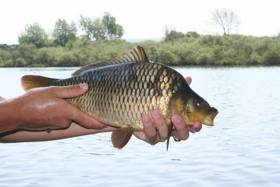Displaying items by tag: Carp Edema Virus
DNA Testing Continues To Confirm Cause Of Cork Carp Kill
#Angling - Scientists at the Marine Institute’s Fish Health Unit are conducting further testing on sample carp from The Lough and Belvelly in Cork after the recent outbreak of suspected carp edema virus.
The tests include sequencing of the viral DNA to confirm its identity, and until confirmed the current findings shall be regarded as preliminary, according to a statement from the Marine Institute.
Molecular tests for Koi Herpesvirus Disease (KHV), a listed disease under European Fish Health legislation, were negative for all fish sampled. Additional molecular tests for cyprinid herpesvirus (other than KHV) were also in progress as of yesterday, Thursday 17 May.
The gills and skin of the sampled fish revealed an extremely high infestation of trichodinid parasites along with a fungal infection. White spots on the scales were also microscopically examined but there was no evidence of Ichthyophthirius multifilius infection.
Virological screening for Spring Viraemia of Carp is still ongoing with no virus observed to date. Bacteriological tests have revealed no growth of bacteria.
“While we’ve identified the presence of CEV — known to cause koi sleepy disease — in all the samples tested to date at the Marine Institute, we are still carrying out further tests for confirmation of the cause of the carp mortalities at The Lough and Belvelly lake,” said Dr Neil Ruane from the Fish Health Unit.
Dr Jeff Fisher, director of marine environment and food safety service at the Marine Institute, added: “Though the ultimate cause of the introduction of the disease agent into the loughs cannot be determined from current information, the loss of significant numbers of carp in these two lakes highlights the need for vigilance among anglers and other recreational users of Irish waters in the cleaning of their equipment and gear thoroughly after use, and also for the need for fishery owners and members of the public to be aware of the potential risk of transferring fish that may carry disease into the wild, and to never release ornamental fish into lakes or rivers.
“We’re continuing to work closely with Inland Fisheries Ireland and Cork City Council, and the Cork Carp Anglers Club to determine the cause of this fish kill, contain the incident, and identify appropriate biosecurity measures for the future.”
More than 750 carp were lost in the outbreak at The Lough in Cork city centre earlier this month, with the Cork Carp Anglers Club estimating the cost of replacing even a fraction of this number at €200,000 or more.





























































